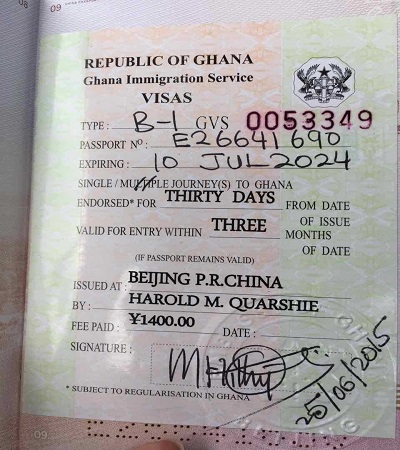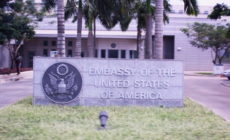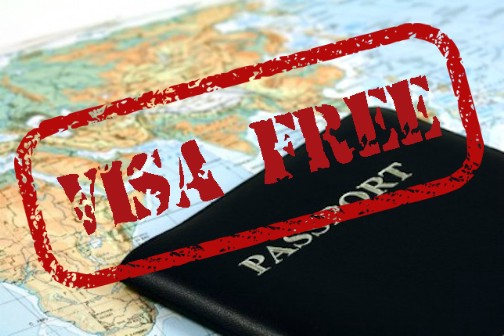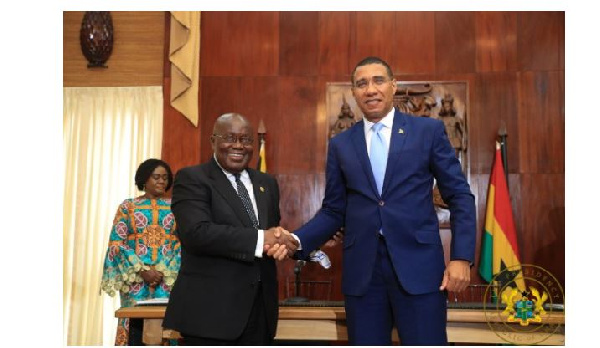2 Ministries battle over issuance of visa
- Posted on
- Comment
 The Ministry of Interior and the Ministry of Foreign Affairs and Regional Integration are engaged in a fierce battle over who has the right to post consular officers to Ghana’s foreign missions to issue visas.
The Ministry of Interior and the Ministry of Foreign Affairs and Regional Integration are engaged in a fierce battle over who has the right to post consular officers to Ghana’s foreign missions to issue visas.
To conform to international best practices world over, Interior Minister Mark Woyongo announced at a Meet-the-Press Series in September this year plans to post officials of the Ghana Immigration Service (GIS) to some selected foreign missions of the country as consular officers.
In pursuant to that, an Immigration Service Bill 2015, currently before Parliament, states one of its functions as “issue visas for the entry into the country and permits for work in the county.”
Information obtained by The Finder indicates that the Ministry of Foreign Affairs and Regional Integration wants the above function in the Immigration Service Bill 2015 limited to issuance of emergency visas only.
But the Interior Ministry says the position of the Foreign Ministry is not backed by law.
As a result of this opposition, debate on that portion of the bill, which is at the consideration stage in Parliament, has been deferred twice.
At the Meet-the-Press Series, Mr Woyongo said there should have been immigration officials in all the foreign missions, but that had not been the case because of financial challenges.
He also announced that due to the high budget associated with such a deployment, the ministry would do it in phases.
For a start, he said, the deployment would target countries from where large numbers of people travelled to Ghana.
All over the world, international best practices require immigration service to issue visas and passports.
The Immigration Act, 2000 (Act 573) and the Immigration Regulations, 2001 (L.I 1691) are the legislations that primarily set out the country’s visa policy. These are operationalised by the visa application and processing regimes in the country’s missions abroad, entry clearance at the ports of entry, emergency visa or visa on arrival application processes and post-entry visa variation/extension processes.
The post-entry visa variation processes include extension of visitor’s permit, issuance of work and residence permits, and re-entry permits.
Section 4 (3) of the Immigration Act, 2000 (Act 573) states that “where a person who appears before an immigration officer does not have a visa or an emergency entry permit, the immigration officer may grant him a visa subject to such conditions as may be prescribed by Regulations, and to such other conditions that the immigration officer may impose.” Additionally, the Director of Immigration is authorised to issue Re-entry Visas under Section 5 of Immigration Act, 2000 (Act, 573).
Regulation 3 (4) of L.I. 1691 states that “an application for an entry visa into Ghana shall be made to the Director or the representative of the Director as in Form B in the Schedule.”
Regulation 4 of L.I. 1691 also states that, “A foreign national who seeks to enter Ghana and who appears before an immigration officer without a Visa shall in accordance with section 4(3) and 4(4) of the Act be granted emergency visa if the immigration officer is satisfied that the foreign national…”
It is relevant to note that the form completed for the acquisition of Ghana visas abroad presently is as captured in Form B of the schedule of Immigration Regulation 2001 (L.I 1691).
These provisions squarely place the responsibility of entry into Ghana as the sole responsibility of the Director of Immigration.
Through circumstances of history and operational expediency, Foreign Service Officers from the Ministry of Foreign Affairs and Regional Integration have been issuing entry visas to Ghana on the strength of this provision. This is done on behalf of the Director of Immigration because Immigration Officers have not been posted to Ghana Missions abroad to perform this function.
It is also equally important to note that various generations of Ghana Visa Stickers being issued at the missions abroad bear the name of the issuing authority as Ghana Immigration Service.
Visa applications are accepted based on documentation produced and security checks, involving accessing the PISCES, INTERPOL I/24 database and Watch List, as well as collaboration with other security institutions before decisions are arrived at, based on the conditions stated in L.I. 1691 and taking cognisance of the national interest.
Passport and visa systems, immigration systems and border management systems are processes used by governments to manage migration.
The visa system, therefore, needs to be seen from a holistic perspective. The process constitutes pre-arrival, arrival, stay and departure at different points in time.
This system needs to be seamless to ensure effective monitoring and enforcement.
The situation whereby different institutions handle different aspects of the process does not augur well for optimal results and undermines the security of the state.
The different actors involved in the visa administration structure makes it inefficient and pose a major challenge to the country’s security and immigration control.
By Elvis DARKO, Accra










 (Selorm) |
(Selorm) |  (Nana Kwesi)
(Nana Kwesi)